A Tale of Two Cities - The 60th Anniversary Oxford and Cambridge Blind Tasting Match
POSTED ON 28/02/2013It is not often that you spot the gentlemen of the wine press attired as if about to start their first day at public school, but smart suits and ties were the order of the day on a freezing cold February morning in the heart of London clubland.
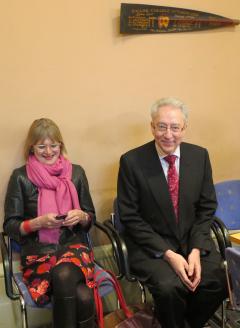 A friend (Jancis Robinson MW) Michael Schuster can phone
A friend (Jancis Robinson MW) Michael Schuster can phone
No, not the morning after the night before at Chinawhite, but the lobby of the Oxford & Cambridge Club in Pall Mall. The occasion? The 60th Anniversary Oxford and Cambridge Blind Wine-Tasting Competition held on Thursday 21 February, a competition originally masterminded by the late Master of Wine Harry Waugh in 1953, the year of the coronation.
Not only were Oxford and Cambridge about to go into blind wine tasting battle, but, for the first time ever, ‘and hopefully the last’, according to one of the organizers, Pol Roger’s James Simpson MW, a trade and press team had also been assembled to do gladiatorial nose to nose combat.
On that cold and frosty morning, you could have been forgiven for losing sight of the fact that blind tasting is supposed to be fun. Already, there had been Twitter rumblings about the fiendish paper set two years ago, described by Jancis Robinson MW as ‘the trickiest blind tasting match ever’.
Both the Oxford and Cambridge teams take this match very seriously indeed. They are in regular, rigorous training. No surprise then that they went straight into nervous huddles on arrival at the club, apparently running through last minute tips. In contrast, it was as much as some of the press could do to get out of bed as such an ungodly hour.
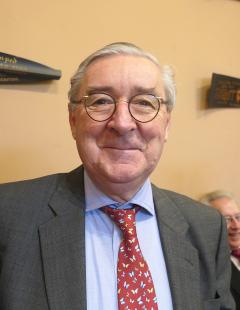 Pol Roger's Patrice Noyelle jets in for the fun and games
Pol Roger's Patrice Noyelle jets in for the fun and games
Much unsuccessful lobbying had been done in advance by the press captain Will Lyons, if not to find out the identity of the wines themselves, at least to get some idea of the kind of wines we might be expected to taste.
Had our august captain been a little laissez-faire in not insisting on any training or a pep talk at least? All he could tell us was that the man who selects the wines, Pol Roger’s Cassidy Dart, said that the wines would be ‘fair’.
Briefing and Tasting
Pol Roger’s James Simpson MW set the ball rolling by announcing the judges: Jancis Robinson MW and Hugh Johnson on the university side, Anthony Hanson MW and Sebastian Payne MW on the trade / press side.
He then briefed the teams. There were to be 12 wines, 6 whites, 6 reds, with 40 minutes tasting for each set of six with a 20 minute break in between. Points would be awarded for grape variety, country, region, district and vintage, and good, legible tasting notes.
What I hadn’t realised when invited asked to join the press team was that there was to be no hiding place. We were to sit with a member of the opposing team on either side with no conferring. I wonder if I would have been quite so quick to accept if I’d known that.
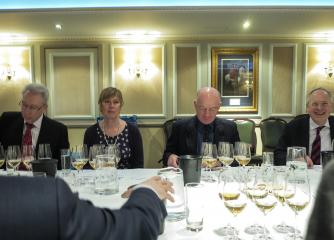 No conferring
No conferring
The Wines
Banter over, we were under starter’s orders. Then we were off. The initial nosing suggested that these were exceptional wines. That helped focus on wine type and style, suggesting the likelihood of an array of French classics. As we tasted, the wines slowly starting to reveal their personalities given a little more time to breathe.
The Whites
1. 2011 Vouvray, Clos du Bourg, Huët. Initially I thought it Italian, possibly Soave, and couldn’t recognize the variety. Tasting it, it seemed French, cool climate, Loire, but but chenin or sauvignon? I opted for Sancerre instead of Vouvray, so sauvignon over chenin.
2. 2011 Château de Beaucastel, Roussanne Vieilles Vignes, Châteauneuf-du-Pape. It first came across as a lightly oaked chardonnay, but after smelling the next wine (obviously a white Burgundy, I thought) no it can’t be chardonnay. It was opulent, peachy, so Rhône surely, but northern or southern? Hmm, I thought northern. Wrong.
3. 2008 Drouhin 2008 Le Montrachet, Marquis de Laguiche. Yes, a tip-top white Burgundy, complex, rich, lots of lees-stirring but 1er or grand cru? I opted for top quality Chassagne Montrachet 2008. In the zone.
4. 1987 Egon Müller Scharzhofberger Riesling Auslese. Dark gold, looked sweet, definitely German riesling on the nose with all that rich and intense but not too sweet apple and honey backed up by Granny Smith acid bite. Mosel yes, but 1980s or 1970s? 1976? Er, not quite.
5. 2010 Georges Vernay Condrieu, Coteau du Vernon. The toughest of the six nuts to crack, spicy and rich, but Alsace or Rhône? I’d ruled out viognier because of my number two guess, so I opted for Alsace pinot gris. Overthinking.
6. 2004 Château Climens, Barsac. I plumped for Hungarian Tokaji to start with, but second time round, after tasting, its rich barley sugar and honey didn’t quite have Tokaji acidity. Barsac but 2003 or 2004? Missed by a year.
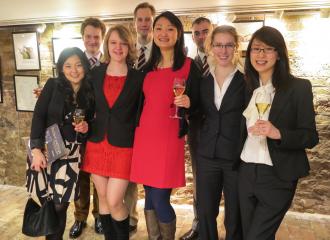 Cambridge - Valiant losers
Cambridge - Valiant losers
The Reds
1. 2006 Saumur Champaigny, Clos Rougeard. This suggested Bordeaux but cabernet franc, or merlot? I opted for Left Bank Bordeaux merlot. Right country, right grape family, wrong region.
2. 2006 Dujac Vosne-Romanée 1er Cru, Malconsorts. Pinot noir fragrance and berry fruit but New Zealand or France? I initially went to New Zealand for its exuberance but reverted to Burgundy because of the tannins, acidity and lower alcohol. But 2005 instead of 2006.
3. 2006 Biondi-Santi Brunello di Montalcino. I thought nebbiolo at first, but not quite enough perfume or nebbiolo tannin, so I reverted to Tuscany, but plumped for top Chianti Classico rather than Brunello, and 2007 rather than 2006.
4. 1995 Haut-Brion, Pessac-Léognan. A beautiful classic Bordeaux to be sure, but Médoc or Graves? I kicked myself later for saying Pauillac because since I’d tasted a 2009 Haut-Brion two weeks ago, the tobacco spice should have been a giveaway.
5. 1953 Vega Sicilia Unico. Remarkable. I plumped for Spain and mature gran reserva Rioja because of the slight American oak coconut and char. One of the press team said in the pub afterwards he’d put down Château Musar, which I thought inspired, but it wasn’t, nor was it Rioja but Ribera. I was out on vintage by a country mile.
6. 2009 Kongsgaard Syrah, Hudson Vineyard, California. Its inky blackness and peppery, spicy violety intensity and savoury power suggested New World syrah and sure enough it was, though I thought Chile’s Elqui Valley.
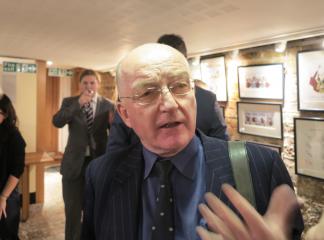 Oz Clarke makes a point
Oz Clarke makes a point
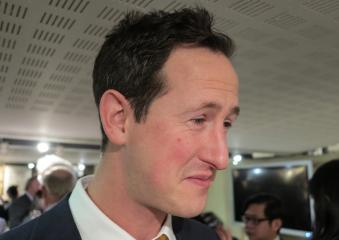 Peter Richards MW remains hopeful
Peter Richards MW remains hopeful
The Awards
The awards ceremony was held in the vaulted cellars of Berry Bros & Rudd’s premises beneath Saint James’s, where animated 2002 Pol Roger-fuelled conversation was followed by the revelation of the wines by Cassidy Dart and the announcements by James Simpson MW.
Accompanied by much whooping, Oxford were declared the winners by 689 points to 677, just 12 points separating the two teams. Both university teams had acquitted themselves well with all those hours of coaching paying off.
Jonathan Pedley from the trade and Michael Schuster on the press side were mentioned in dispatches as the equal second two top tasters. I won a consolation magnum of Pol Roger 2000 Cuvée Sir Winston Churchill as top taster; satisfying but bittersweet result in the context of an even more agonizingly close contest: the trade clinched it by 914 to 908 points.
No matter, the ambiance was exceptional and the occasion was great fun. As Jasper Morris appeared to observe in his closing speech after a well-deserved liquid lunch, there had been a great ‘carameladerie’.
A final word on blind tasting. First of all it’s a game and should be fun, however seriously you take it. It isn’t an exact science but there is a deductive process involved. Basically, you need to engage nose and brain and use your intuition.
As the Cambridge captain Ellie Kim said, ‘blind tasting is quite scientific because it’s about both using your head and your senses’. True, and Lady Luck plays a big part too. What works for you one day may not work the next.
Why do it? ‘It’s about creating a challenge for ourselves’, said Ellie Kim. How true. The real competition is with no-one else but yourself. As a recent tweet recalling the words of Andrew Carnegie sums up nicely: ‘Do not look for approval except for the consciousness of doing your best’.
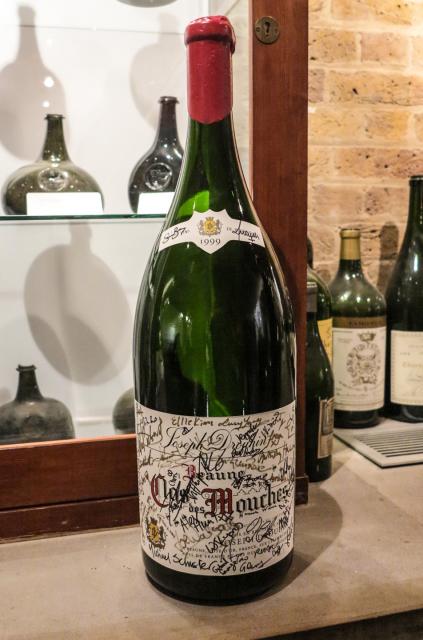 A little luncheon Burgundy
A little luncheon Burgundy
The Teams
Press:
1. Will Lyons – Wall Street Journal - Captain
2. Oz Clarke
3. Joe Wadsack
4. Peter Richards MW
5. Anthony Rose – Independent
6. Matthew Jukes – Daily Mail
7. Michael Schuster
Trade:
1. Jasper Morris MW - Captain
2. Arabella Morris MW
3. Jon Pedley MW
4. Alex Hunt MW
5. Gearoid Devaney MS
6. Christopher Delalonde MS
7. George Scratcherd (reserve) for Catriona Felstead MW
Oxford
1. Ren Lim - Captain
2 David Soud
3. James Anderson
4. Swii Yii Lim
5. Henry Little
6. Tao Ruan
7. Tom Arnold
Cambridge
1. Ellie Kim - Captain
2. Antoni Wrobel
3. Madeline Huberth
4. Jennifer Yen
5. Vaiva Imbrasaite
6. Stefan Kuppen
7. Lucy Yang

